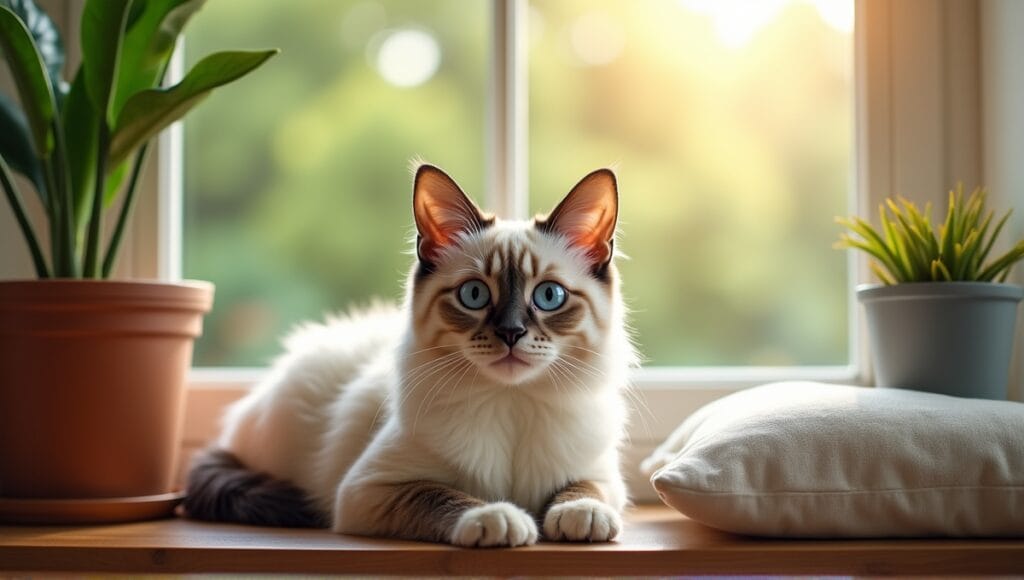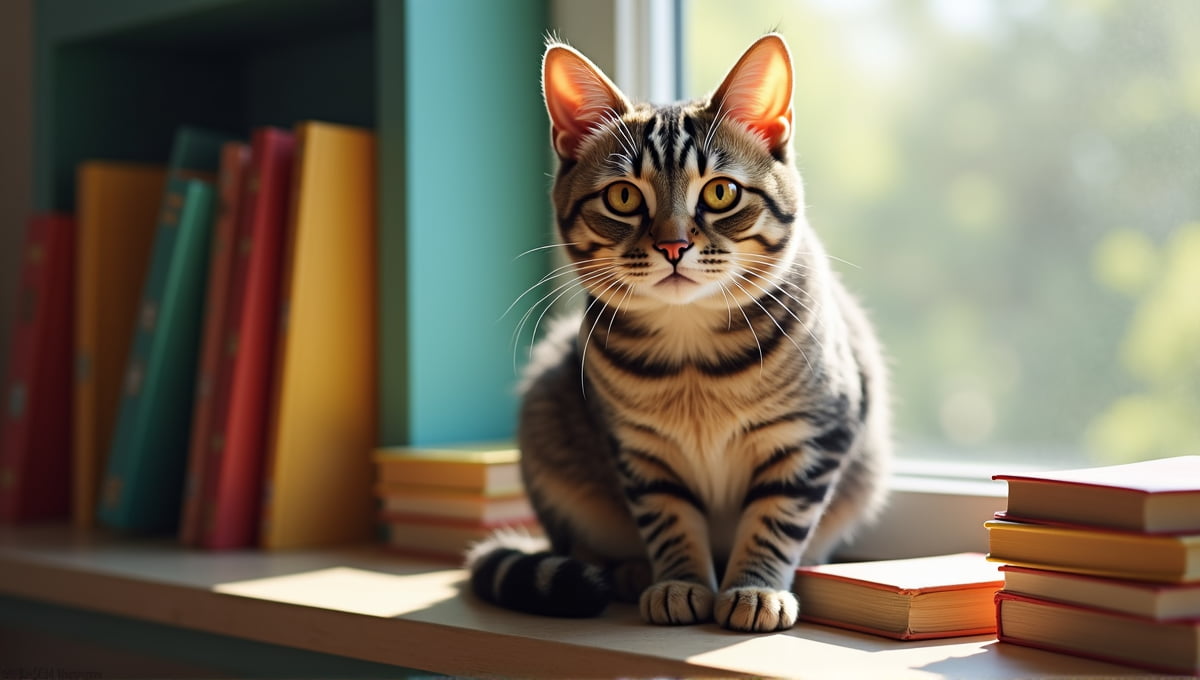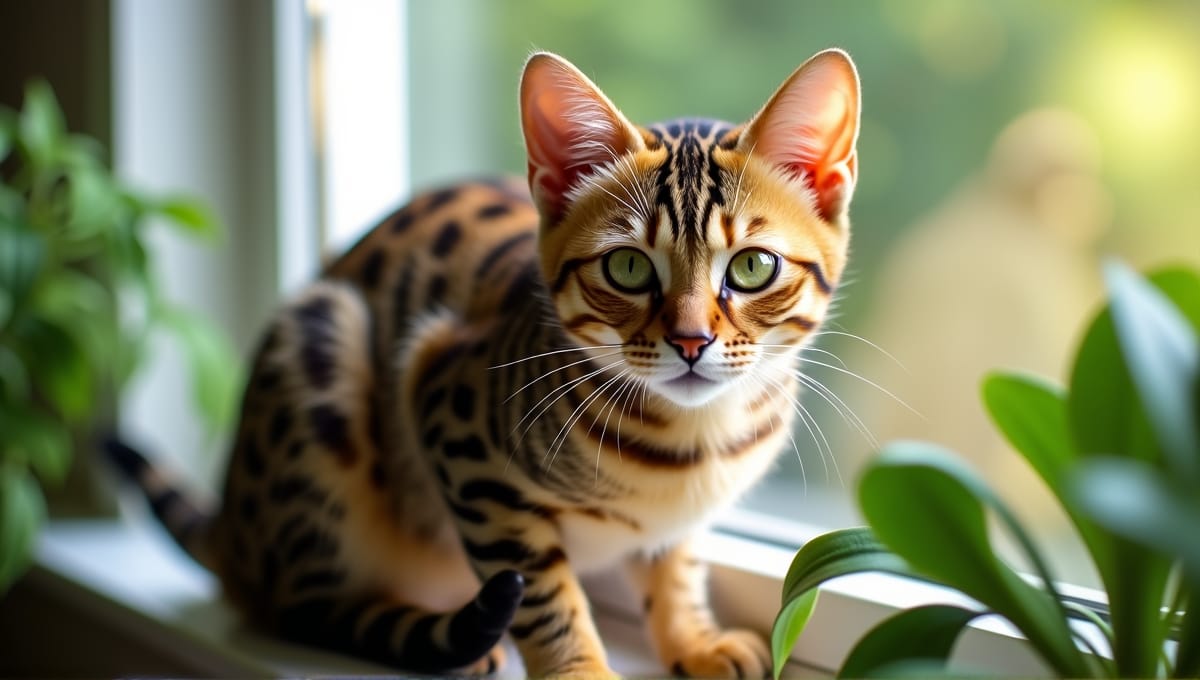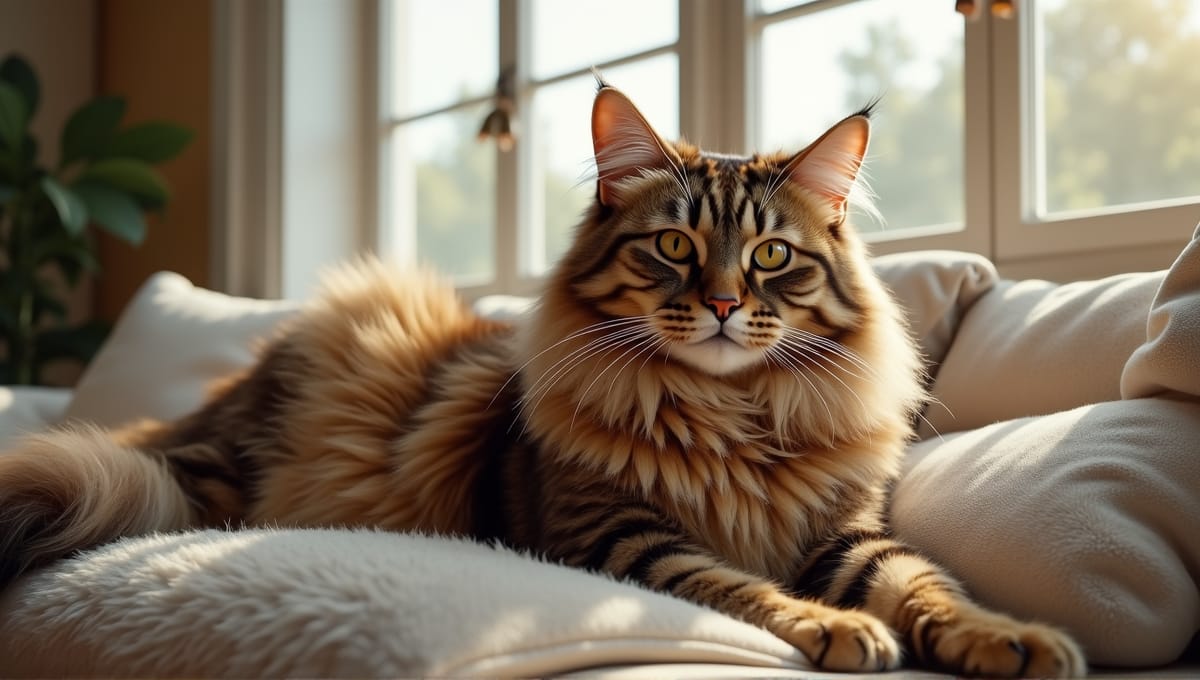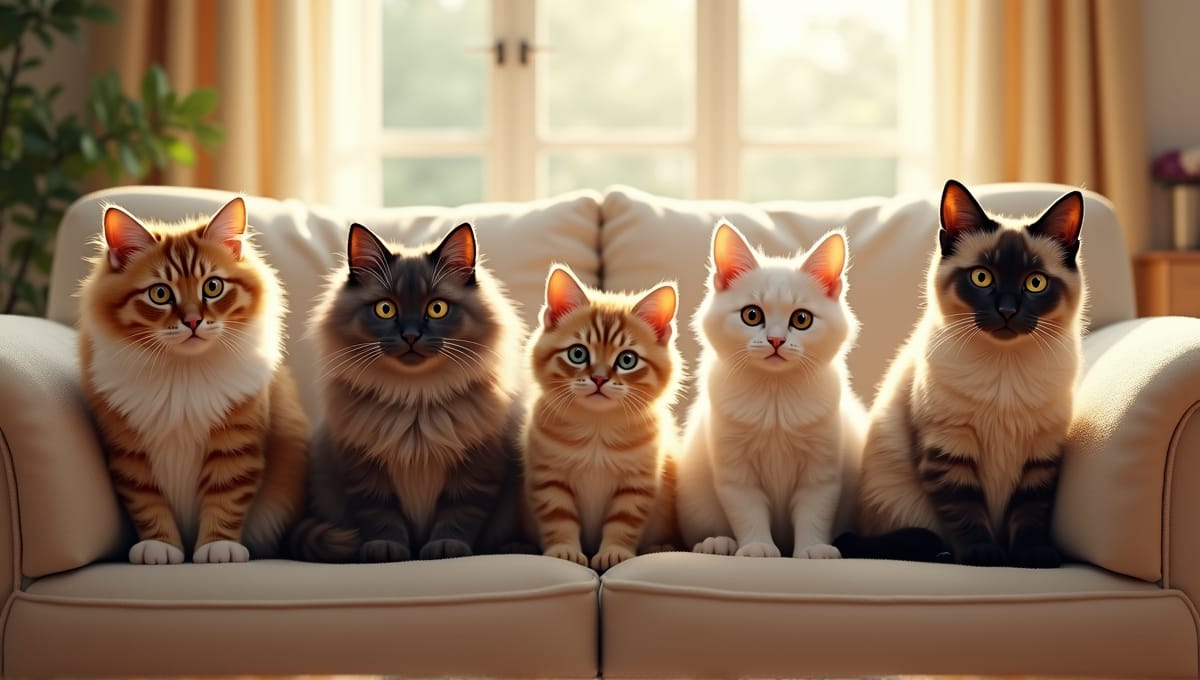Cats make excellent pets. I’ve worked with different breeds for many years and I know which breeds are the most friendly from my own experience. So, you’re likely wondering which cat breed is the best fit for your home and lifestyle. Here are some of the top options for friendly cats that make great family pets.
Top Friendly Cat Breeds
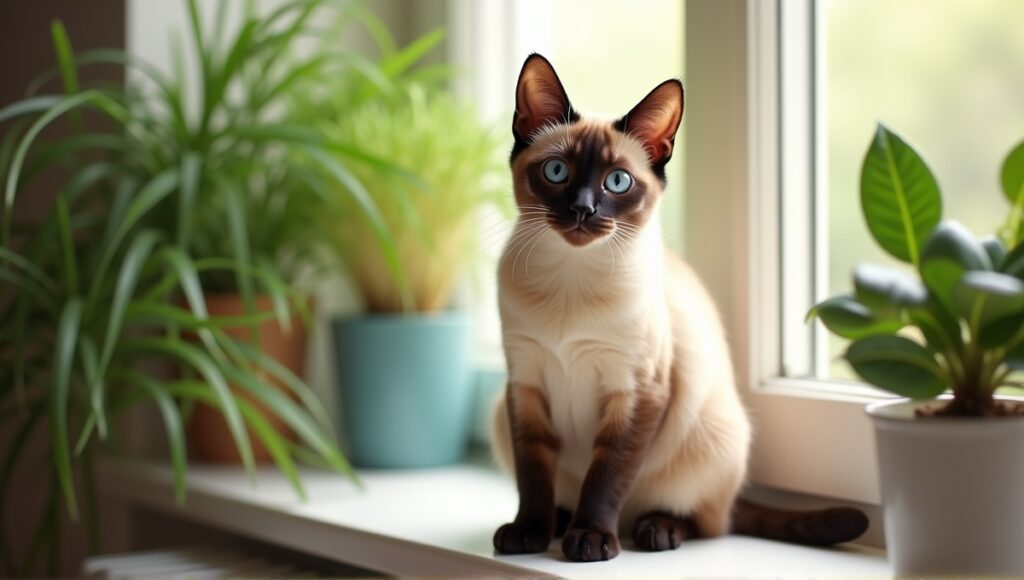
Friendly cat breeds are excellent choices as pets. I’ve personally come into contact with many of these delightful cats throughout the years. Here are some of the best options to consider for your next furry friend.
Ragdolls are famous for their calm dispositions. These cats with striking blue eyes are happiest when they’re snuggled up next to their people. In fact, 96% of Ragdoll owners report that their cats will greet guests without hesitation. They are also:
- Extremely gentle
- Very loving
- Patient with kids
- Willing to adapt to new environments
Maine Coons are the gentle giants of the cat world. The larger, fluffier cats of this breed are surprisingly sociable. Many also exhibit dog-like behaviors, and 85% of Maine Coons follow their people from room to room. Maine Coons are playful and enjoy interacting with people and other pets. Additionally, they are:
- Intelligent and easy to train
- Loyal to family members
- Comfortable with being handled
Siamese cats are very vocal and people-oriented. These cats talk a lot, making them a good choice if you want a cat you can hold conversations with. Siamese cats are also:
- Highly attentive to their people
- Energetic and playful
- Quick learners
Abyssinians bring a lot of energy and excitement to any home. These cats are very active and thrive on human interaction, playtime, and other forms of stimulation. Abyssinians are also:
- Among the most intelligent cats
- Curious about everything
- Athletic and agile
- Always ready to play games
Persian cats make relaxed and calm companions. These cats are very loving and enjoy lounging around with their people. Additionally, Persian cats spend 4-6 hours per day seeking human interaction. They are also:
- Very gentle and laid-back
- Quiet and not very demanding
- Affectionate with humans
- Patient with kids
Scottish Folds are also known to have folded ears and easy-going dispositions. These cats are also:
- Very calm and relaxed
- Comfortable with being handled
- Moderately active
- Friendly with other pets
Personality Traits of Friendly Cat Breeds
When selecting a friendly cat breed, you should consider a few central personality traits that determine how well a cat will fit into your life and family.
Many cat lovers rank affection at the top of their list of friendly cat traits. After all, affectionate breeds actively seek human companionship. Additionally, they’re often willing to follow you around the house and/or sit on your lap. As a result, these breeds form strong attachments to their owners.
Handling tolerance matters, especially if you have kids. Some breeds naturally enjoy being held, brushed, dressed up, and more. These patient breeds are a great choice for families with kids or just people who enjoy holding cats.
Friendliness extends beyond the immediate family. If a breed of cat is friendly, it’s typically one that will also greet visitors and isn’t afraid of people. Some breeds also enjoy being the center of attention at a party. These breeds may also have what it takes to become therapy cats or just the office cat.
Playfulness makes living with a cat more fun. Interactive breeds of cats do just that – they interact with you and often initiate playtime. If your friendly breed also loves to play, then you’ve likely found a winner.
Adaptability allows a cat to thrive in different environments. Some breeds of friendly cats also easily adapt to new people, pets, and more. While some cats are certainly high-strung, a friendly breed usually tends to tolerate change very well.
Vocalization varies among breeds of friendly cats. Some breeds, like Siamese, are known for being very “talkative.” Meanwhile, others are a little more subtle about letting you know what they need. Therefore, this is another characteristic to consider when choosing a breed of friendly cat.
It’s worth noting that 65% of cats show secure attachment styles with their owners. However, while a cat breed may be considered friendly, any cat’s specific friendliness isn’t set in stone. Genetics influence about 50% of a cat’s personality, but the other 50% is the result of the environment and experiences. Therefore, your interactions with and care of the cat are mostly responsible for shaping their friendly behavior.
Compatibility with Children and Other Pets
It’s essential to select a cat breed that is a good fit for your family. Some breeds are naturally better suited to homes with children or other pets. Here’s what to consider:
- Gentle temperament and patience with kids
- High tolerance of handling and noise
- Playful nature and can match children’s energy
- Ability to peacefully coexist with dogs/other cats
- Social tolerance in multi-pet households
Cats that have been raised with kids will typically have a higher tolerance for handling. When a cat is exposed to kids, it will get accustomed to their unpredictable behavior. Ragdoll and Maine Coon cats are known for their gentle nature with children.
Playfulness is another aspect of the relationship between a cat and a child. More active breeds like Abyssinians and Siamese cats can play with kids. They enjoy games and will form a strong bond with the children in the household.
Cats that are more tolerant of other animals are ideal for multi-pet households. Some breeds get along well with dogs and other cats, such as the Scottish Fold. If a cat gets along well with other pets, it will make your household a much happier place.
Always prioritize safety. Teach your kids how to interact with a cat properly, and never leave them alone with it if the cat is unfamiliar. You should also give cats safe spaces to retreat to, particularly if the cat is introduced to new pets.
Keep in mind that individual cats will have different personalities, and early socialization is crucial. If a cat has been raised around a lot of people, the cat will probably get along with more people. Similarly, exposure to other animals at a young age will help the cat get along well with other pets as an adult.
Care Requirements for Friendly Cat Breeds
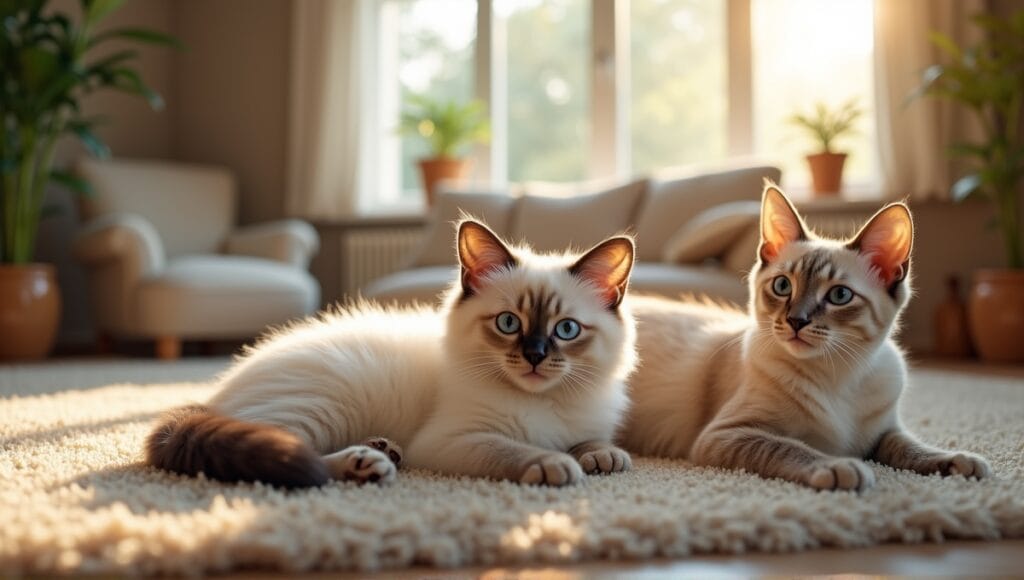
Proper care ensures your friendly feline is happy and healthy, so learn the basics of caring for your cat. Each breed will have different care requirements, but there are some general steps you can take to care for any breed.
Grooming needs vary significantly by breed. For example, long-haired cat breeds like Persians need daily brushing to prevent their coats from matting, while short-haired breeds may only need brushing once a week. Regular grooming will help keep your cat looking and feeling great and also help strengthen your bond with your pet.
All cats need exercise and play, so make sure your cat receives it. Abyssinian cats, for example, need 4–5 hours of play per day. You can provide interactive toys, climbing structures, and playtime to ensure your cat receives enough mental and physical stimulation.
Dietary needs will vary based on your cat’s breed, so make sure you’re meeting your cat’s specific requirements. Some breeds might be more prone to weight gain, while other breeds might have higher energy needs. Work with your veterinarian to build a diet plan that’s right for your cat.
Some breeds may have breed-specific health concerns. For example, Maine Coon cats are prone to heart issues. Scheduling regular vet checkups can help identify any issues early.
Environmental enrichment is important for all friendly cats. You can ensure your cat is happy and content inside your home by providing scratching posts, perches, and hiding spots. You can rotate out toys so they don’t get bored with them.
Socialization and training are also important for creating a friendly cat. Use positive reinforcement to train your cat, and make sure to expose your cat to many people and situations so it remains friendly and sociable.
Remember that each cat is an individual. These are the care requirements you need to follow, but you should also be in tune to your cat’s individual needs and preferences. If you meet all of your cat’s care needs, you’ll have a friendly feline that thrives and provides you with years of joy.
Factors Influencing Cat Friendliness
Understanding why a cat is friendly will allow you to encourage these traits. Several factors determine a cat’s sociability:
- Genetics and breed
- Early socialization and handling
- Environmental factors
- Positive reinforcement and training
- Regular human interaction
- Stress reduction
Genetics and breed are the most obvious ones to consider. Some cat breeds are simply more sociable than others. However, environmental factors play a significant role in how sociable a cat is.
Early socialization is perhaps the most important aspect of creating friendly cats. Kittens need to be handled and socialized to humans early in life to grow up to be friendly adults. This happens during a critical window of 2 to 7 weeks after they are born.
How a kitten is handled during the first 8 weeks of its life will determine how socially confident it is as an adult. If a kitten is handled frequently but not roughly, it will grow up to be a confident, sociable adult cat. If not, it won’t.
Environmental factors also determine how sociable a cat will be. A cat raised in a stable, calm home will naturally be friendlier. On the other hand, a cat raised in a chaotic, unstable home will be fearful and not sociable.
Positive reinforcement is another key aspect of sociable cats. If a cat is given a treat, praise, and playtime whenever it acts sociably, the cat will continue to repeat the behavior in the future.
Regular human interaction is essential to maintaining a cat’s sociability. Quality time spent playing, grooming, or even lounging with a human is what makes a cat sociable. This regular bonding solidifies a cat’s desire to be around humans.
Stress reduction is essential to a cat feeling confident enough to be friendly. If you provide cats with safe places, quiet areas, and a predictable routine, they will feel secure and will naturally be more sociable with humans.
Gender Differences in Cat Friendliness
If you’re looking for a friendly feline companion, you may be curious if gender matters. While each cat has its own unique personality, there are some general characteristics to consider.
Male cats tend to be more naturally sociable than female cats. They seek human attention more often and may be more tolerant of handling. This isn’t to say female cats aren’t sociable, but they’re likely to be a tad more independent.
Temperament is significantly influenced by whether the cat has been fixed. Fixed cats are less likely to be aggressive and are often more affectionate. This difference is most noticeable in male cats, as fixing them significantly reduces territorial behaviors.
If your cat is intact, sociability is significantly influenced by hormones. When females are in heat, they might become less friendly. Males may display more aggressive or aloof behavior when their hormones are raging.
However, personality always trumps gender. You’ll find plenty of female cats that are outgoing and plenty of male cats that are more reserved. Spend some time with a cat before adopting to get a feel for its personality.
There are also breed-specific differences in gender. In certain breeds, such as Maine Coons, males are more outgoing, while females are a bit more reserved. Research your specific breed to learn more about any gender-specific personality differences.
Long-term Considerations for Friendly Cat Breeds
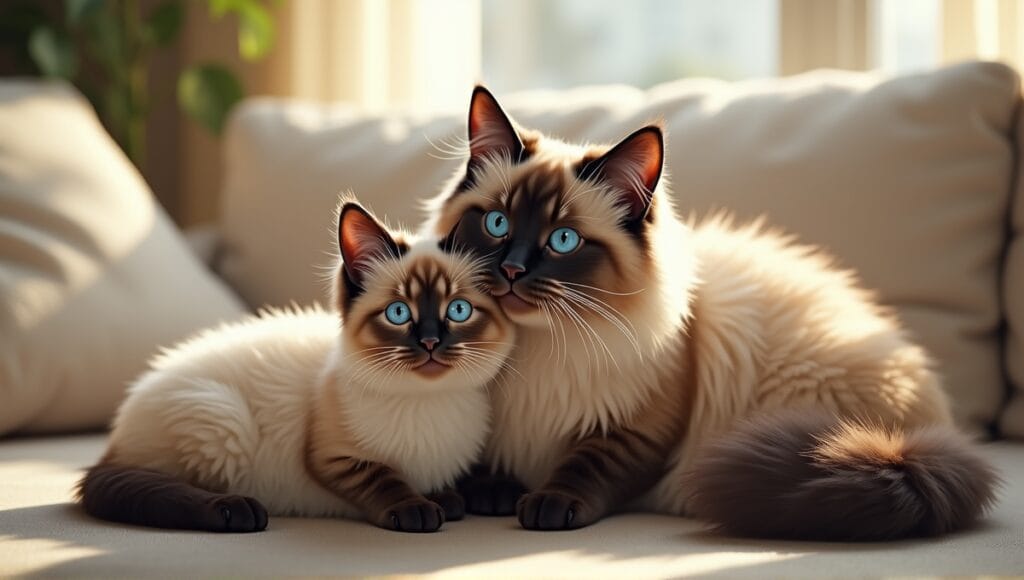
Selecting a friendly cat breed is a long-term decision. Understanding what you can expect from your cat over the course of their life prevents a long term happy relationship.
The lifespan of course varies by breed, but many friendly cats live for several years. Ragdoll and Maine Coon cats, for example, have an average lifespan of 12-15 years. Make sure you’re willing to commit to these many years of your cat if you’re looking for a friendly breed.
Remember that your cat’s temperament can change as they age. Many cats become more relaxed and affectionate as they get older. Others may be less tolerant of being handled due to discomfort from age-related health issues. Regular veterinary checkups can help address any health problems that are affecting your cat’s mood.
Life changes can also impact your cat’s behavior. Moving, new family members, or even a change in your schedule can change your cat. The best way to help your cat adapt to these changes is to keep a consistent routine and give your cat more attention to help them feel secure.
You’ll also need to continue socializing and interacting positively with your cat throughout their life. This will reinforce their friendly nature and maintain a strong bond with your cat.
Health problems can also make your cat less social as they get older. For example, arthritis or dental pain may prevent your cat from wanting to interact as much. Prompt veterinary care can help ensure you have a social senior cat.
Keep in mind that every cat ages differently. Pay attention to your cat’s changing likes and dislikes. With proper care and attention, your friendly feline can be a loyal pet well past their prime.
Final Takeaways
Friendly cat breeds provide endless happiness and friendship. Whether you select a loving Ragdoll or a sassy Abyssinian, each of these cats has its own special charm. Keep in mind that a cat’s friendliness isn’t solely determined by genetics. Early socialization, positive experiences, and good care are also important.
You’re now equipped with the information you need to select and raise a cat that’s an ideal match for you. With the right breed and care, you’ll enjoy many years of purring, cuddles, and all the other delightful aspects of having a cat.


